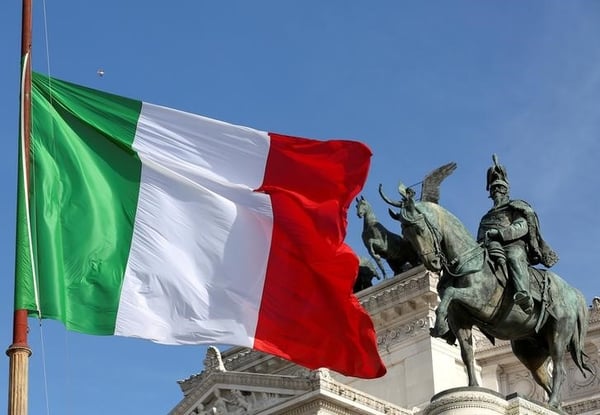Last Sunday Italians voted to elect a new government. We are used to doing that. Italy holds the record for the most government turnovers in Europe (perhaps in the world) with 65 in the 70 years of the Republic. How is that possible?
My non-Italian friends have asked me about the Italian elections because they care, because they are worried, and because they are perhaps amused by it but want to understand.
I will give you a bit of explanation, as I would to friends over dinner.

Some background.
After the 20-year Mussolini fascism regime sided in the most awkward ways with the Italian monarch (Vittorio Emanuele III of Savoy), Italy wanted a fresh start and Italians wanted to put WWII behind them.
Italy was literally destroyed but it had a vision. That vision was to let people decide between monarchy and republic and to put not only fascism but all dictatorial threats in a sterile state.
The fear of another totalitarian regime (even after elections such as in Mussolini’s case) was very much the “elephant in the room” when it came time to write the new Italian Constitution.
The constitution is written in such a way that in practical terms it prevents anyone – party or leader - from having a strong say on anything. One might argue that 65 governments in 70 years is proof that things went too far. In 2016, Matteo Renzi (prime minister #64 PD) promoted a referendum that – among other things – would have given more power to the government, arguing that “more things would finally get done.” It goes almost without saying that Italians did not like that and that the referendum on which Renzi put so much emphasis killed his career soon after.
Cause and effect of the situation we are in is also the proliferation of too many new parties and unlikely coalitions. Everyone who disagrees with the leadership leaves and starts a new party. That often has the side effect of government crisis and...new elections.
There might not be a winner.
Italy is corrupt. Top-down corrupt. A new grassroots movement has established itself as the legal and ethical alternative with young – and as of yet mostly unproven – representatives. The Movimento Cinque Stelle (Five Star Movement) won the elections as a single party with 32% of the vote. The Five Star Movement is a bit unrefined politically but they are learning quickly. Abroad, most people cannot get past the fact that the movement (they don’t call themselves a party) was started by a relentless stand-up comedian: Beppe Grillo.
Italians have seen the PD (center left) of Renzi failing – Mr. Gentiloni #65 took over after Renzi – and Italians also point a finger at the PD for having written two electoral laws in 5 years that have done nothing good to help the electoral process: the first one was partially unconstitutional, and the second one, under which the latest vote was cast, does not allow for a clear winner. M5S took away many of the votes once belonging to PD (especially in the South).
Northern Italians could not resist the temptation of going to the right and voting in great numbers for the coalition of Forza Italia (Berlusconi) – Lega - Fratelli d’Italia. The three party alliance got 35% of the vote with Berlusconi, at 82 years of age and with his controversial political and judicial past, having to leave the leadership to Salvini of Lega. Salvini’s campaign was mostly anti-immigration rhetoric and it struck a cord with EU skeptics.
All political commentators say that M5S and Lega are the winners, but there might not be a winner, after all. No one has enough elected representatives to run the show.
In any case:
- Italians favored the so-called anti-establishment parties.
- Berlusconi is over for good.
- The Left is becoming more and more irrelevant as it is so in the rest of Europe.
The European Union feared our elections. A Brexit move would be a disaster, but the threat of it is convincing the EU that something has to change in the EU project. They might finally listen. The anti-establishment (or new-establishments) leaders have already shown a more open attitude towards the Union that was often blamed for leaving Italy alone in dealing with immigration, and that kept asking – imposing, really - reforms to cut the huge Italian public debt leaving nothing on the table for social policies.
The vote in Italy was not a tragedy in spite of what you may have read in many newspapers outside of Italy. Many news outlets talked about catastrophic scenarios. The catastrophe might be that President Mattarella would have to call for new elections if no one has sufficient numbers to govern.
Here’s the list of Italian governments (Republican Italy) for your enjoyment:
XVII Legislatura (dal 15 marzo 2013)
elezioni politiche 24 e 25 febbraio 2013
Governo Gentiloni (dal 12 dicembre 2016)
Governo Renzi (dal 22 febbraio 2014 al 12 dicembre 2016)
Governo Letta (dal 28 aprile 2013 al 21 febbraio 2014)
XVI Legislatura (dal 29 aprile 2008 al 23 dicembre 2012)
elezioni politiche 13 e 14 aprile 2008
Governo Monti (dal 16 novembre 2011 al 27 aprile 2013)
Governo Berlusconi IV (dall'8 maggio 2008 al 16 novembre 2011)
XV Legislatura (28 aprile 2006 - 6 febbraio 2008)
elezioni politiche 9 e 10 aprile 2006
Governo Prodi II (dal 17 maggio 2006 al 6 maggio 2008)
XIV Legislatura (30 maggio 2001 - 27 aprile 2006)
elezioni politiche il 13 maggio 2001
Governo Berlusconi III (dal 23 aprile 2005 al 17 maggio 2006)
Governo Berlusconi II (dall'11 giugno 2001 al 23 aprile 2005)
XIII Legislatura (9 maggio 1996 - 9 marzo 2001)
elezioni politiche il 21 aprile 1996
Governo Amato II
Governo D'Alema II
Governo D'Alema
Governo Prodi
XII Legislatura (15 aprile 1994 - 16 febbraio 1996)
elezioni politiche il 27 marzo 1994
Governo Dini
Governo Berlusconi
XI Legislatura (23 aprile 1992 - 16 gennaio 1994)
elezioni politiche il 4 aprile 1992
Governo Ciampi
Governo Amato
X Legislatura (2 luglio 1987 - 2 febbraio 1992)
elezioni politiche il 14 giugno 1987
Governo Andreotti VII
Governo Andreotti VI
Governo De Mita
Governo Goria
IX Legislatura (12 luglio 1983 - 28 aprile 1987)
elezioni politiche il 26 giugno 1983
Governo Fanfani VI
Governo Craxi II
Governo Craxi
VIII Legislatura (20 giugno 1979 - 4 maggio 1983)
elezioni politiche il 3 giugno 1979
Governo Fanfani V
Governo Spadolini II
Governo Spadolini
Governo Forlani
Governo Cossiga II
Governo Cossiga
VII Legislatura (5 luglio 1976 - 2 aprile 1979)
elezioni politiche il 20-21 giugno 1976
Governo Andreotti V
Governo Andreotti IV
Governo Andreotti III
VI Legislatura (25 maggio 1972 - 1 maggio 1976)
elezioni politiche il 7-8 maggio 1972
Governo Moro V
Governo Moro IV
Governo Rumor V
Governo Rumor IV
Governo Andreotti II
V Legislatura (5 giugno 1968 - 28 febbraio 1972)
elezioni politiche il 19 maggio 1968
Governo Andreotti
Governo Colombo
Governo Rumor III
Governo Rumor II
Governo Rumor
Governo Leone II
IV Legislatura (16 maggio 1963 - 11 marzo 1968)
elezioni politiche il 28 aprile 1963
Governo Moro III
Governo Moro II
Governo Moro I
Governo Leone
III Legislatura (12 giugno 1958 - 18 febbraio 1963)
elezioni politiche il 25 maggio 1958
Governo Fanfani IV
Governo Fanfani III
Governo Tambroni
Governo Segni II
Governo Fanfani II
II Legislatura (25 giugno 1953 - 14 marzo 1958)
elezioni politiche il 7 giugno 1953
Governo Zoli
Governo Segni
Governo Scelba
Governo Fanfani
Governo Pella
Governo De Gasperi VIII
I Legislatura (8 maggio 1948 - 4 aprile 1953)
elezioni politiche il 18 aprile 1948
Governo De Gasperi VII
Governo De Gasperi VI
Governo De Gasperi V
Ordinamento provvisorio: 25 luglio 1943 - 23 maggio 1948
Assemblea costituente :25 giugno 1946 - 31 gennaio 1948
Proclamazione della Repubblica: 2 giugno 1946
Governo De Gasperi IV
Governo De Gasperi III
Governo De Gasperi II (primo governo della Repubblica)
Governo De Gasperi
Governo Parri
Governo Bonomi II
Governo Bonomi
Governo Badoglio II
Governo Badoglio












